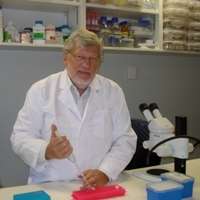Inherited retinal disease research may lead to treatment

Inherited retinal disease is a major cause of vision impairment in early life - and a researcher at The University of Western Australia hopes a study in which he was involved will contribute towards the development of a drug-based treatment.
The study which was led by Winthrop Professor David Hunt from UWA's Neuroecology Group and Lions Eye Institute, and included researchers from University College London, was published recently in the international Journal of Biological Chemistry.
Professor Hunt and his colleagues examined the genetic origins of a blinding disorder, in which symptoms include a loss of central vision and visual acuity, progressing on to a severe impairment of vision.
Earlier research found the disorder was caused by mutations in the gene that encodes a particular potassium channel protein, and Professor Hunt and his team looked at the effects of mutant channel proteins on the overall function of potassium channels.
Potassium channels are found throughout most living organisms and generate electrical signals. In the eye, the channels affect the function of cone and rod photoreceptors and the presence of mutant forms of channel proteins can be diagnosed quite specifically by a patients' particular reaction to flashes of light.
Professor Hunt and his colleagues investigated the impact of five mutant channel proteins in vitro in cultured cells. They discovered two distinct mechanisms in the disease pathology. In one, the channels were non-conducting and in the other, non-functional channels were created. The molecular mechanisms are very different in each case but the clinical impact on the development of the disease is the same.

















